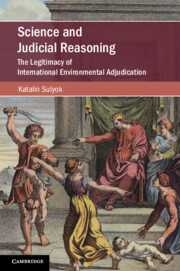Book contents
- Science and Judicial Reasoning
- Cambridge Studies On Environment, Energy And Natural Resources Governance
- Science and Judicial Reasoning
- Copyright page
- Dedication
- Contents
- Tables
- Foreword
- Acknowledgements
- Author Note
- Table of Cases
- Abbreviations
- Part I The Three-Fold Challenge of Engaging with Science in International Environmental Adjudication
- Part II Techniques for Judicial Engagement with Science in the Practice of International Courts and Tribunals
- Part III Engaging with Scientific Knowledge in the Judicial Reasoning
- 9 Trends in Judicial Engagement with Science: A Comparative Assessment
- 10 Science and the Legitimacy of Judicial Reasoning
- Conclusion
- Bibliography
- Index
10 - Science and the Legitimacy of Judicial Reasoning
from Part III - Engaging with Scientific Knowledge in the Judicial Reasoning
Published online by Cambridge University Press: 15 October 2020
- Science and Judicial Reasoning
- Cambridge Studies On Environment, Energy And Natural Resources Governance
- Science and Judicial Reasoning
- Copyright page
- Dedication
- Contents
- Tables
- Foreword
- Acknowledgements
- Author Note
- Table of Cases
- Abbreviations
- Part I The Three-Fold Challenge of Engaging with Science in International Environmental Adjudication
- Part II Techniques for Judicial Engagement with Science in the Practice of International Courts and Tribunals
- Part III Engaging with Scientific Knowledge in the Judicial Reasoning
- 9 Trends in Judicial Engagement with Science: A Comparative Assessment
- 10 Science and the Legitimacy of Judicial Reasoning
- Conclusion
- Bibliography
- Index
Summary
This chapter argues that downplaying science in the judicial inquiry has a fundamental impact on the ways in which legitimate and persuasive reasoning can be crafted. More particularly, not respecting the cognitive authority of science undermines the epistemic legitimacy of decisions. The central yardstick in this respect is not that using more science would necessarily result in better-reasoned judgments; rather, the legitimacy of judgments hinges on how adjudicators reflect on the scientific aspects of disputes in the reasoning. The chapter identifies four types of epistemic yardsticks with which international fora justify the acceptance or rejection of a particular science-based claim. The chapter differentiates between legal, scientific, hybrid, and intuitive reasoning styles, and discusses the benefits and trade-offs of each of them in terms of factual accuracy, epistemic non-arbitrariness, practical feasibility, and preserving the judicial monopoly over adjudication. The chapter also offers solutions for remedying applicable shortcomings, and offers recommendations for selecting a sound approach to scientific knowledge in the judicial reasoning under particular circumstances.
Keywords
- Type
- Chapter
- Information
- Science and Judicial ReasoningThe Legitimacy of International Environmental Adjudication, pp. 332 - 366Publisher: Cambridge University PressPrint publication year: 2020

